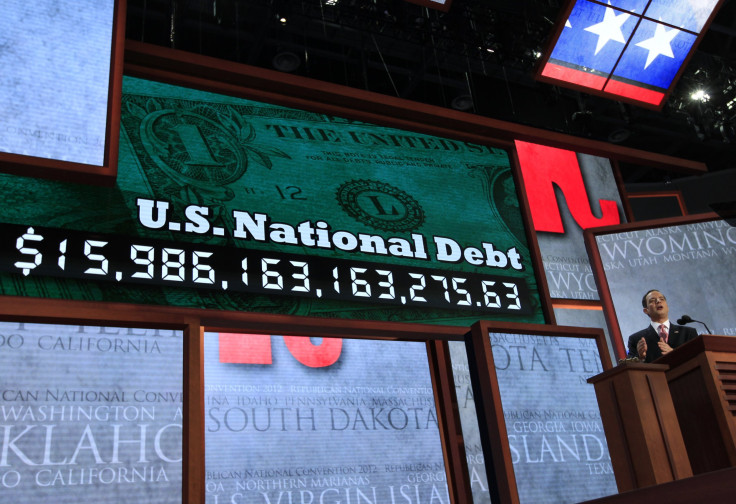Debt Limit 2014: Explaining The Issue And What's At Stake

The House Republican leadership’s plan to increase the 2014 U.S. debt limit with conditions that would secure enough GOP votes appears to be failing, leaving them no other option but to try to craft a proposal that would attract Democratic support.
The U.S. Treasury Department's normal mechanisms for paying bills ends Friday, Treasury Secretary Jack Lew said, but because of careful accounting practices that can be employed by the Treasury, lawmakers have until the end of this month to increase the federal government’s borrowing authority.
House Speaker John Boehner, R-Ohio, and his allies found they had to discard ideas to link the debt ceiling to a proposal to approve the Keystone XL oil pipeline. House Leadership likewise had to reject taking another whack at repealing parts of the Affordable Care Act, also known as Obamacare, when they realized they couldn’t garner 218 Republican votes.
What's more, Democrats would prefer a clean debt-limit bill, but House Republicans don’t want to make it that easy, so the GOP appears set to try to extract something for increasing the U.S. government's borrowing authority. House leaders are considering attaching the seemingly always-popular “doc fix” legislation to prevent sharp cuts in reimbursement payments to doctors who treat Medicare patients. Other ideas include restoring the recent cuts to U.S. military pensions.
Congress must raise the $16.7 trillion debt limit or risk a default on its obligations. Earlier this week, Treasury Secretary Lew said this time around there is only a “brief span of time” within which to use his department’s extraordinary measures. The Treasury will only have on-hand cash after it exhausts its borrowing capacity. The payment of income tax refunds in March means there will be a cash-crunch with more money going out of the coffers.
To learn more, the International Business Times spoke with with Stan Veuger, a resident scholar at the American Enterprise Institute, a Washington, D.C.-based public policy think tank.
IBTimes: What’s the best way to describe the debt ceiling and how does it work?
Veuger: The debt ceiling is a limit on borrowing by the federal government. Once it’s hit the federal government can only use incoming revenue to finance expenditures, even if Congress has authorized expenditures that exceed incoming revenue (like now, and pretty much always).
IBTimes: How high must it be raised?
Veuger: By as much as possible.
IBTimes: How many times has it been raised in the past?
Veuger: 78 times since 1960.
IBTimes: Does it increase spending?
Veuger: There’s no real evidence for that. Most future federal spending has been authorized already under Social Security, Medicare, etc.
IBTimes: Do we need a debt ceiling?
Veuger: No. Even without a debt ceiling, the Congress would still have to authorize all spending it hasn’t authorized already. It’s not like the president can suddenly run off with all of the nation’s cash.
IBTimes: If the Treasury’s money runs out, what will happen?
Veuger: It will not be able to pay the bills.
IBTimes: How many bills does the Treasury processes daily?
Veuger: They do 5 to 10 million transactions a day.
IBTimes: What will happen if the Treasury cannot pay its bills?
Veuger: The U.S. will default on some of its obligations.
IBTimes: Unpaid bills risk a default. What are the signs of an approaching default?
Veuger: Rising measured uncertainty, decreasing levels of consumer confidence, rising T-bill rates.
IBTimes: What will happen if America defaults on its obligations?
Veuger: Credit would freeze up, and a global financial crisis would probably ensue.
IBTimes: Has America ever defaulted before?
Veuger: Except for an extraordinarily costly mechanical glitch in 1979, not since the 19th century.
Note: Here’s what took place after that.
IBTimes: Is a brief default acceptable?
Veuger: Not if it’s the result of an intentional decision by Congress or the President.
IBTimes: What is at stake here in this debt limit fight with Congress?
Veuger: The full faith and credit of the United States.
IBTimes: What will this mean for ordinary citizens?
Veuger: A full-fledged financial crisis would probably do at least as much harm as the last one, of which we have still not fully recovered.
IBTimes: Why is there so much politics if this is such an important piece of government function?
Veuger: Because it’s easy to spin opposition to raising the debt limit as fiscally responsible behavior -- president [Barack] Obama did the same thing back when he was a Senator.
Note: Obama has defended his 2006 vote against a debt-limit increase.
IBTimes: Last year, Republicans said America will never default because it can always prioritize payments. Is this true and how does this work, if at all?
Veuger: The Treasury department claims that it is incapable of doing so; that in and of itself makes it an unacceptable way out to gamble on.
IBTimes: If both sides decide not to budge from their stance and the federal borrowing limit isn’t extended, what’s the next option?
Veuger: That’s uncharted territory.
IBTimes: Is there anything else you would like to add?
Veuger: If not full elimination, elevation of the debt limit to keep pace with authorized spending automatically would be an important improvement.
© Copyright IBTimes 2025. All rights reserved.






















